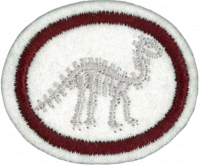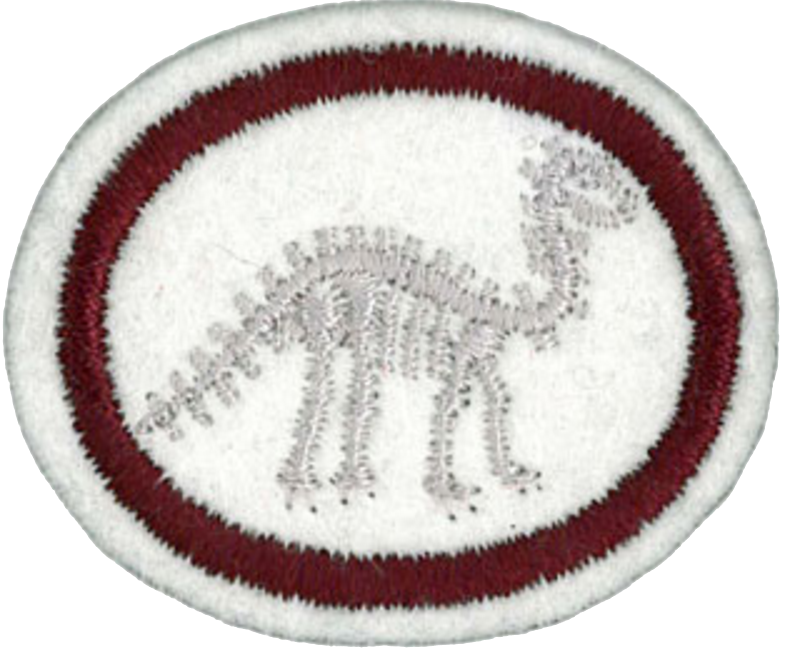Difference between revisions of "AY Honors/Fossils/Requirements 2"
m |
(Fossils 2024 Update - Requirements) |
||
| Line 4: | Line 4: | ||
<b>1. <section begin=req1 /><noinclude><translate><!--T:1--> | <b>1. <section begin=req1 /><noinclude><translate><!--T:1--> | ||
| − | </noinclude> | + | </noinclude>Provide a brief definition of each of the following terms: |
<noinclude></translate></noinclude><section end=req1 /></b> | <noinclude></translate></noinclude><section end=req1 /></b> | ||
| + | |||
| + | :<b>a. <section begin=req1a /><noinclude><translate></noinclude>Geology | ||
| + | <noinclude></translate></noinclude><section end=req1a /></b> | ||
| + | |||
| + | :<b>b. <section begin=req1b /><noinclude><translate></noinclude>Fossils | ||
| + | <noinclude></translate></noinclude><section end=req1b /></b> | ||
| + | |||
| + | :<b>c. <section begin=req1c /><noinclude><translate></noinclude>Catastrophism | ||
| + | <noinclude></translate></noinclude><section end=req1c /></b> | ||
| + | |||
| + | :<b>d. <section begin=req1d /><noinclude><translate></noinclude>Paleontology | ||
| + | <noinclude></translate></noinclude><section end=req1d /></b> | ||
<b>2. <section begin=req2 /><noinclude><translate><!--T:2--> | <b>2. <section begin=req2 /><noinclude><translate><!--T:2--> | ||
| − | </noinclude> | + | </noinclude>Draw, make a model or include a photograph the following: |
<noinclude></translate></noinclude><section end=req2 /></b> | <noinclude></translate></noinclude><section end=req2 /></b> | ||
:<b>a. <section begin=req2a /><noinclude><translate><!--T:3--> | :<b>a. <section begin=req2a /><noinclude><translate><!--T:3--> | ||
| − | </noinclude> | + | </noinclude>Radiolaria |
<noinclude></translate></noinclude><section end=req2a /></b> | <noinclude></translate></noinclude><section end=req2a /></b> | ||
:<b>b. <section begin=req2b /><noinclude><translate><!--T:4--> | :<b>b. <section begin=req2b /><noinclude><translate><!--T:4--> | ||
| − | </noinclude> | + | </noinclude>Crinoid, Graptolite |
<noinclude></translate></noinclude><section end=req2b /></b> | <noinclude></translate></noinclude><section end=req2b /></b> | ||
:<b>c. <section begin=req2c /><noinclude><translate><!--T:5--> | :<b>c. <section begin=req2c /><noinclude><translate><!--T:5--> | ||
| − | </noinclude> | + | </noinclude>Trilobite |
<noinclude></translate></noinclude><section end=req2c /></b> | <noinclude></translate></noinclude><section end=req2c /></b> | ||
:<b>d. <section begin=req2d /><noinclude><translate><!--T:6--> | :<b>d. <section begin=req2d /><noinclude><translate><!--T:6--> | ||
| − | </noinclude> | + | </noinclude>Dinosaur |
<noinclude></translate></noinclude><section end=req2d /></b> | <noinclude></translate></noinclude><section end=req2d /></b> | ||
:<b>e. <section begin=req2e /><noinclude><translate><!--T:7--> | :<b>e. <section begin=req2e /><noinclude><translate><!--T:7--> | ||
| − | </noinclude> | + | </noinclude>Mastodon, Mammoth |
<noinclude></translate></noinclude><section end=req2e /></b> | <noinclude></translate></noinclude><section end=req2e /></b> | ||
:<b>f. <section begin=req2f /><noinclude><translate><!--T:8--> | :<b>f. <section begin=req2f /><noinclude><translate><!--T:8--> | ||
| − | </noinclude> | + | </noinclude>Brachiopod, Pelecypod |
<noinclude></translate></noinclude><section end=req2f /></b> | <noinclude></translate></noinclude><section end=req2f /></b> | ||
:<b>g. <section begin=req2g /><noinclude><translate><!--T:9--> | :<b>g. <section begin=req2g /><noinclude><translate><!--T:9--> | ||
| − | </noinclude> | + | </noinclude>Lingula |
<noinclude></translate></noinclude><section end=req2g /></b> | <noinclude></translate></noinclude><section end=req2g /></b> | ||
| − | |||
| − | |||
| − | |||
| − | |||
| − | |||
| − | |||
| − | |||
| − | |||
| − | |||
| − | |||
| − | |||
| − | |||
| − | |||
| − | |||
| − | |||
| − | |||
| − | |||
| − | |||
| − | |||
| − | |||
| − | |||
| − | |||
| − | |||
| − | |||
| − | |||
| − | |||
| − | |||
| − | |||
| − | |||
| − | |||
| − | |||
| − | |||
| − | |||
| − | |||
| − | |||
| − | |||
| − | |||
| − | |||
| − | |||
| − | |||
| − | |||
| − | |||
| − | |||
| − | |||
| − | |||
| − | |||
| − | |||
| − | |||
| − | |||
| − | |||
| − | |||
| − | |||
| − | |||
| − | |||
| − | |||
| − | |||
<section begin=challenge /> | <section begin=challenge /> | ||
<b>3. <section begin=req3 /><noinclude><translate><!--T:24--> | <b>3. <section begin=req3 /><noinclude><translate><!--T:24--> | ||
| − | </noinclude> | + | </noinclude>Explain the characteristics of the Paleozoic, Cenozoic, Mesozoic and Pleistocene eras. Place them in chronological order. Explain why Creationists use these terms. |
<noinclude></translate></noinclude><section end=req3 /></b> | <noinclude></translate></noinclude><section end=req3 /></b> | ||
<section end=challenge /> | <section end=challenge /> | ||
| Line 110: | Line 66: | ||
<b>6. <section begin=req6 /><noinclude><translate><!--T:27--> | <b>6. <section begin=req6 /><noinclude><translate><!--T:27--> | ||
| − | </noinclude>From the Bible and writings of Ellen G. White cite statements to explain the origin of | + | </noinclude>From the Bible and writings of Ellen G. White, cite statements to explain the origin of fossils. |
| − | |||
| − | |||
| − | |||
| − | |||
<noinclude></translate></noinclude><section end=req6 /></b> | <noinclude></translate></noinclude><section end=req6 /></b> | ||
| + | |||
| + | <b>7. <section begin=req7 /><noinclude><translate></noinclude>Research five fossil ancestors of animals living today. How do the fossil ancestors compare and contrast with modern animals? | ||
| + | <noinclude></translate></noinclude><section end=req7 /></b> | ||
| + | |||
| + | <b>8. <section begin=req8 /><noinclude><translate></noinclude>Do two of the following: | ||
| + | <noinclude></translate></noinclude><section end=req8 /></b> | ||
| + | |||
| + | :<b>a. <section begin=req8a /><noinclude><translate></noinclude>Spend time searching for fossils and attempting to identify them. Bring them in to show your Pathfinder Club. | ||
| + | <noinclude></translate></noinclude><section end=req8a /></b> | ||
| + | |||
| + | :<b>b. <section begin=req8b /><noinclude><translate></noinclude>Make a plant or animal fossil model with plaster, clay or other medium. | ||
| + | <noinclude></translate></noinclude><section end=req8b /></b> | ||
| + | |||
| + | :<b>c. <section begin=req8c /><noinclude><translate></noinclude>Visit a museum where fossils are on display and make a written or oral report of your trip. | ||
| + | <noinclude></translate></noinclude><section end=req8c /></b> | ||
| + | |||
| + | <b>9. <section begin=req9 /><noinclude><translate></noinclude>Make a collection of at least ten different kinds of fossils and label each with its name and geographic location. Classify them as impression, mineralized, trace or preserved organic material. | ||
| + | <noinclude></translate></noinclude><section end=req9 /></b> | ||
| + | |||
| + | <b>10. <section begin=req10 /><noinclude><translate></noinclude>Prepare a parable or short spiritual lesson based on fossils using what has been learned in this honor. | ||
| + | <noinclude></translate></noinclude><section end=req10 /></b> | ||
| + | |||
<section end=Body /> | <section end=Body /> | ||
Revision as of 15:21, 27 March 2024
1. Provide a brief definition of each of the following terms:
- a. Geology
- b. Fossils
- c. Catastrophism
- d. Paleontology
2. Draw, make a model or include a photograph the following:
- a. Radiolaria
- b. Crinoid, Graptolite
- c. Trilobite
- d. Dinosaur
- e. Mastodon, Mammoth
- f. Brachiopod, Pelecypod
- g. Lingula
3. Explain the characteristics of the Paleozoic, Cenozoic, Mesozoic and Pleistocene eras. Place them in chronological order. Explain why Creationists use these terms.
4. Describe the process of the proper removal of delicate specimens. Tell how a skeleton of a dinosaur or other gigantic fossil would be removed. Why should beginners not remove such specimens? What should be done by the beginner when he finds what is obviously a valuable fossil?
5. Explain the difference in the account scientists give for the presence of fossils as related by evolutionists and creationists.
6. From the Bible and writings of Ellen G. White, cite statements to explain the origin of fossils.
7. Research five fossil ancestors of animals living today. How do the fossil ancestors compare and contrast with modern animals?
8. Do two of the following:
- a. Spend time searching for fossils and attempting to identify them. Bring them in to show your Pathfinder Club.
- b. Make a plant or animal fossil model with plaster, clay or other medium.
- c. Visit a museum where fossils are on display and make a written or oral report of your trip.
9. Make a collection of at least ten different kinds of fossils and label each with its name and geographic location. Classify them as impression, mineralized, trace or preserved organic material.
10. Prepare a parable or short spiritual lesson based on fossils using what has been learned in this honor.


